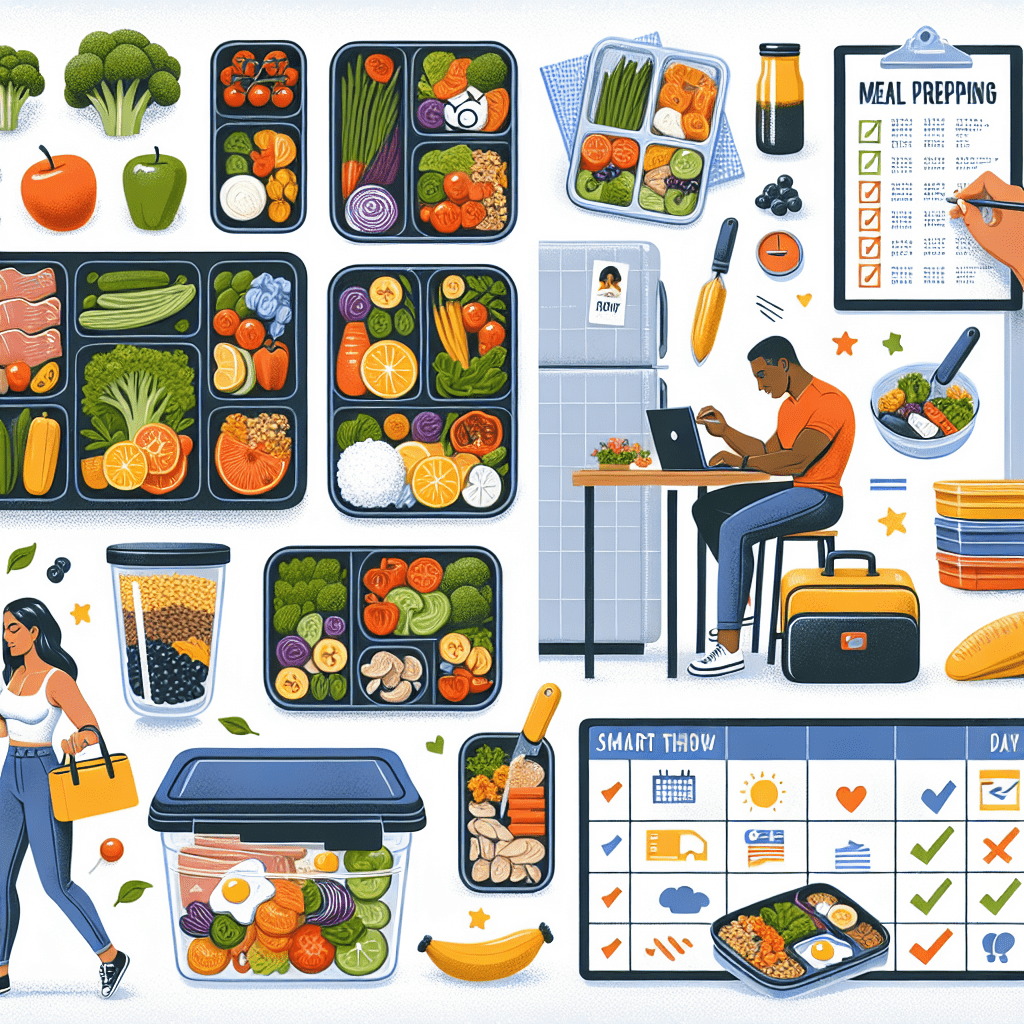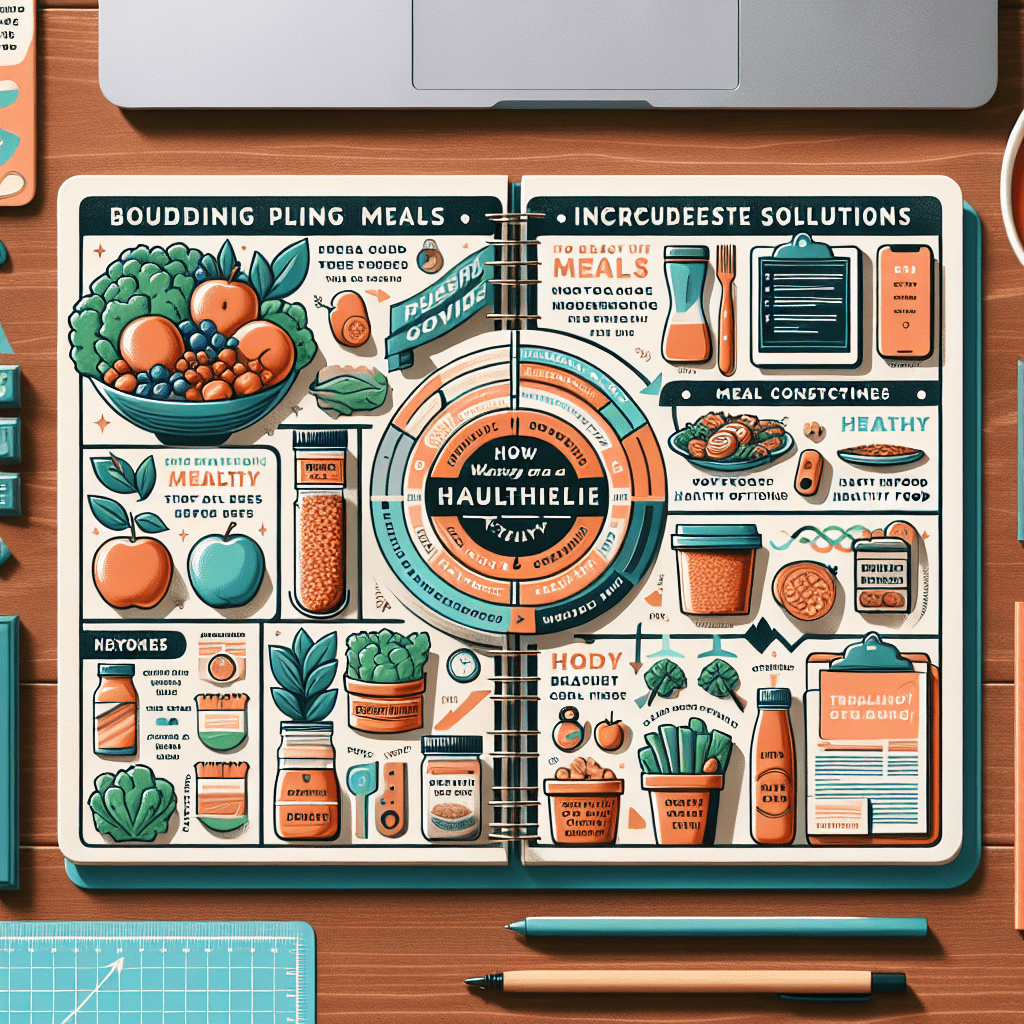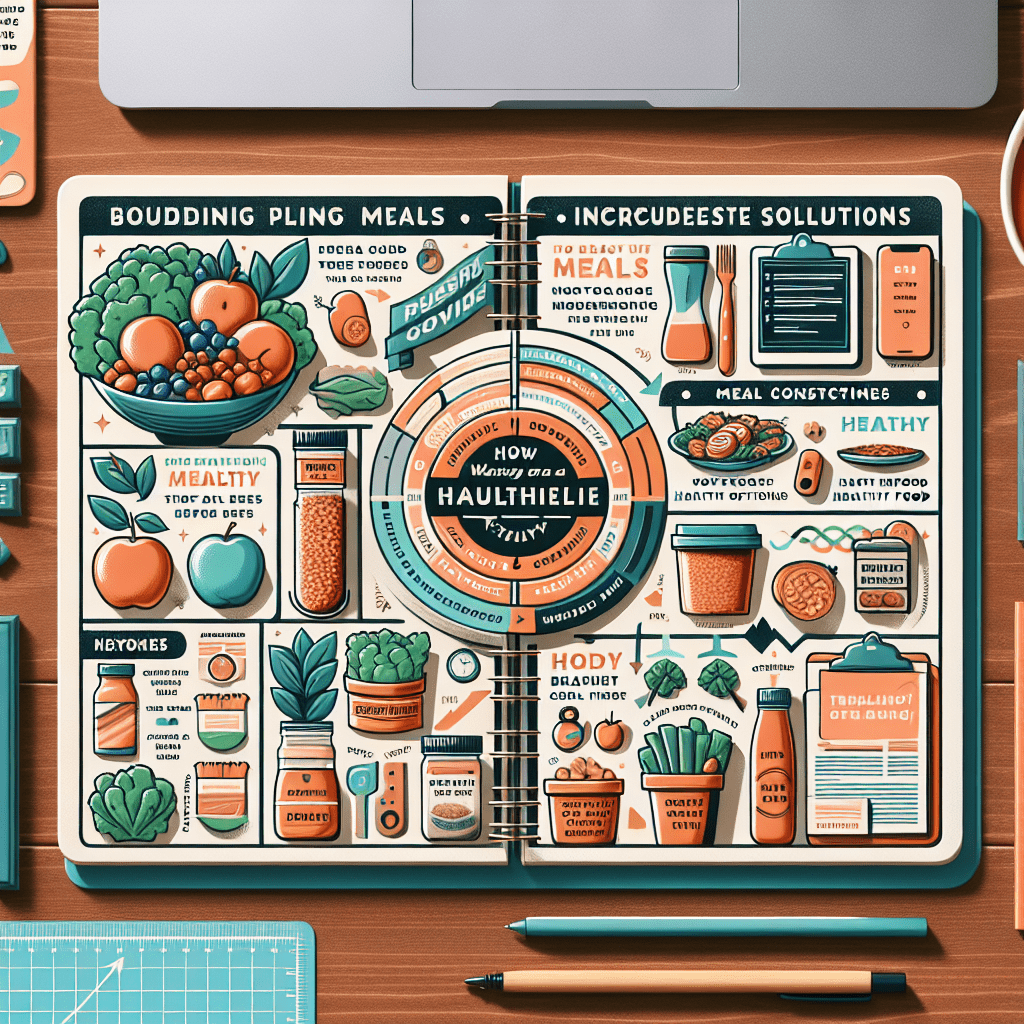How Can I Maintain A Balanced Diet On A Busy Schedule. In today’s fast-paced world, finding the time and energy to maintain a balanced diet can be a challenge. With busy schedules and never-ending to-do lists, it’s easy to prioritize convenience over nutrition. But fear not, for you can still achieve a healthy, well-rounded diet even with your jam-packed days. By making smart choices, planning ahead, and incorporating simple strategies into your daily routine, you can nourish your body and cultivate a sense of balance amidst the chaos.
Plan ahead
Life can get busy and chaotic, making it difficult to find the time to prioritize your health. However, with some thoughtful planning and preparation, it is possible to maintain a balanced diet even on the busiest of schedules. Here are some tips to help you stay on track:
Create a meal plan
One of the most effective ways to ensure you’re eating a balanced diet is to create a meal plan. Take some time each week to plan out your meals and snacks. This will not only save you time and stress but also help you make healthier choices. Include a variety of foods from different food groups to ensure you’re getting all the nutrients your body needs.
Prep meals in advance
Meal prepping is a game-changer when it comes to maintaining a balanced diet on a busy schedule. Dedicate some time on the weekends or your day off to cook and portion out meals for the week. This way, you’ll have nutritious and delicious meals ready to go when you need them. Consider investing in meal prep containers to make the process even easier.
Pack healthy snacks
When you’re on the go, it’s essential to have healthy snacks on hand. Pack some pre-cut fruits and vegetables, nuts, or energy bars to keep you fueled throughout the day. By having healthy snacks readily available, you’re less likely to reach for unhealthy choices when hunger strikes.
Make time for breakfast
Breakfast is often referred to as the most important meal of the day, and for a good reason. It jump-starts your metabolism and provides you with the energy you need for the day ahead. Here are some tips to help you make time for breakfast, even on busy mornings:
Choose quick and nutritious options
If you’re short on time in the morning, opt for quick and nutritious breakfast options. Greek yogurt with berries and granola, overnight oats, or a smoothie packed with fruits, vegetables, and protein are all great choices. These breakfasts can be prepared in advance and enjoyed on the go.
Prepare breakfast the night before
Spare a few minutes each night to prepare your breakfast for the next day. Overnight oats or chia seed pudding can be prepared and stored in the refrigerator, allowing you to grab and go in the morning. You can also prep ingredients for a quick omelet or breakfast burrito that can be cooked and enjoyed within minutes.
Consider meal replacement shakes
If you’re really pressed for time, meal replacement shakes can be a convenient option. Look for shakes that are low in sugar and packed with protein, fiber, and other essential nutrients. These shakes can be a quick and easy breakfast alternative that still provides your body with the fuel it needs to start the day off right.

Choose convenient and healthy options
When life gets hectic, convenience often takes precedence over healthy choices. However, it is still possible to make convenient and healthy choices that fuel your body properly. Here are some tips to help you make smart choices even when you’re short on time:
Opt for whole foods
Whole foods are the foundation of a healthy diet. Instead of relying on processed and packaged foods, make an effort to include more whole foods in your diet. Fruits, vegetables, lean proteins, whole grains, and healthy fats should be the main components of your meals and snacks. These foods are nutrient-dense and provide your body with the essential vitamins and minerals it needs to thrive.
Choose nutrient-dense snacks
When you’re craving a snack, choose options that are nutrient-dense rather than empty calories. Instead of reaching for a bag of chips or a candy bar, grab a handful of almonds, a piece of fruit, or some carrot sticks with hummus. These snacks provide your body with essential nutrients and keep you feeling satisfied between meals.
Explore healthy fast food alternatives
Fast food doesn’t have to mean unhealthy. With more and more fast-food chains offering healthier options, it’s easier than ever to find nutritious meals on the go. Look for salads, grilled chicken sandwiches, or vegetable-based options when dining out. If you’re in a rush, many fast-food establishments now offer convenient pre-packaged salads or protein boxes that you can grab and enjoy on the go.
Control portion sizes
Portion control plays a crucial role in maintaining a balanced diet. It’s easy to overeat when you’re busy or stressed, but by practicing portion control, you can ensure you’re consuming the right amount of food for your body. Here are some tips to help you control portion sizes:
Use smaller plates
Using smaller plates can trick your brain into thinking you’re consuming more food than you actually are. By using a smaller plate, you can control portion sizes without feeling deprived. The visual illusion of a full plate can help satisfy your brain and prevent overeating.
Practice mindful eating
Mindful eating is the practice of paying attention to your food and eating in a slow, intentional manner. Take the time to savor each bite, chew your food thoroughly, and pay attention to your body’s hunger and fullness cues. By eating mindfully, you can avoid overeating and make better choices about when to stop eating.
Avoid eating out of large packages
Eating out of large packages, such as bags of chips or boxes of cookies, can lead to mindless overeating. Instead, portion out snacks into smaller containers or bags. This way, you can have a predetermined portion size and avoid the temptation to keep reaching into the package for more.

Stay hydrated
Staying hydrated is essential for overall health and well-being. It helps regulate body temperature, supports digestion, and aids in nutrient absorption. Here are some tips to help you stay hydrated throughout the day:
Carry a water bottle
Keeping a water bottle with you at all times is a simple and effective way to ensure you’re drinking enough water. Choose a reusable water bottle that you can refill throughout the day. Having water readily available will remind you to stay hydrated and make it easy to reach your daily water intake goals.
Drink water before meals
Drinking a glass of water before meals can help you feel fuller and prevent overeating. It’s easy to mistake thirst for hunger, so staying hydrated can help you differentiate between the two. Plus, water has zero calories, making it a great choice to hydrate without adding unnecessary calories to your diet.
Limit sugary beverages
Sugary beverages, such as soda, juice, and sweetened coffee drinks, can add unnecessary calories and spike your blood sugar levels. Instead, opt for water, herbal tea, or unsweetened beverages. If you need some flavor, try infusing your water with fruits or herbs for a refreshing and tasty twist.
Be mindful of your eating habits
In addition to making smart food choices, being mindful of your eating habits can go a long way in maintaining a balanced diet. Here are some tips to help you develop a healthier relationship with food:
Avoid emotional eating
Many people turn to food as a means of coping with stress, anxiety, or other emotions. However, emotional eating can lead to overeating and making unhealthy food choices. Instead of relying on food for comfort, find alternative ways to manage your emotions, such as exercise, journaling, or talking to a friend.
Eat slowly and savor each bite
Eating slowly allows your brain to receive signals from your stomach, indicating that you’re full. Take the time to chew your food thoroughly and savor each bite. By eating slowly, you’ll feel more satisfied and be less likely to overeat.
Listen to your body’s hunger and fullness cues
Your body knows best when it comes to hunger and fullness. Pay attention to your body’s signals and eat when you’re truly hungry, not just out of habit or boredom. Likewise, stop eating when you’re satisfied, even if there’s still food left on your plate. Trust your body to guide you in making the right choices for nourishment.

Smart grocery shopping
Making good choices at the grocery store sets the stage for a balanced diet. Here are some tips to help you shop smart and make healthier choices:
Make a shopping list
Before heading to the grocery store, make a shopping list based on your meal plan. This will help you stay focused and avoid impulse purchases of unhealthy foods. Stick to your list and only buy what you need for your planned meals and snacks.
Shop for fresh produce
Load up on fresh fruits and vegetables during your grocery shopping trips. These nutrient-dense foods should be the star of your meals and snacks. Choose a variety of colors to ensure you’re getting a wide range of vitamins and minerals.
Read food labels
Take the time to read food labels and choose products with minimal ingredients and no added sugars or unhealthy additives. Look for whole grain options, low sodium levels, and products with recognizable, natural ingredients. Being aware of what you’re putting into your body is an essential part of maintaining a balanced diet.
Meal prepping tips
Meal prepping can save you time, money, and stress throughout the week. Here are some tips to help you get started with meal prepping:
Batch cook and freeze meals
Dedicate a few hours on the weekends to batch cook meals and store them in the freezer. This way, you’ll have ready-made meals that you can simply defrost and enjoy when you’re pressed for time during the week. Soups, casseroles, and stir-fries are great options for batch cooking and freezing.
Use time-saving kitchen appliances
Invest in time-saving kitchen appliances, such as a slow cooker, instant pot, or air fryer. These appliances can significantly speed up the cooking process and make meal prepping easier. With the help of these tools, you can have a delicious and nutritious meal on the table in no time.
Utilize leftovers
Don’t let leftovers go to waste. Instead, repurpose them into new meals or use them as the foundation for your next day’s lunch. Get creative with your leftovers and transform them into something new and exciting. Planning meals around leftovers can save you time and money while still ensuring you’re eating a balanced diet.

Incorporate healthy snacks
Snacking can be a downfall when it comes to maintaining a balanced diet. However, by incorporating healthy snacks into your routine, you can keep your hunger at bay and make better choices. Here are some tips for incorporating healthy snacks:
Prepare grab-and-go options
Having snacks that are easy to grab and go is vital for busy days. Pre-portion snacks such as trail mix, fruit, or carrot sticks with hummus and keep them readily available in your pantry or fridge. This way, you’ll always have a healthy option to reach for when hunger strikes.
Keep a variety of snacks at work
Instead of relying on vending machine options or unhealthy office snacks, bring your own. Keep a variety of healthy snacks at work, such as nuts, seeds, protein bars, or single-serving packs of nut butter. Having these snacks readily available will prevent you from making impulsive and unhealthy choices.
Choose snacks high in protein and fiber
Protein and fiber are both important nutrients that can help keep you feeling full and satisfied. When choosing snacks, opt for options that are high in protein and fiber, such as Greek yogurt, edamame, or cottage cheese. These snacks will provide you with sustained energy and prevent cravings between meals.
Seek support and accountability
Embarking on a journey towards a balanced diet can be challenging, especially when you have a busy schedule. It’s essential to seek support and accountability to help you stay on track. Here are some ways to find support:
Find a workout buddy
Having a workout buddy can provide motivation and support. Find someone who shares similar health goals and schedule regular workout sessions together. Not only will this hold you accountable, but it will also make exercising more enjoyable.
Join a healthy eating group
Look for local or online groups focused on healthy eating and balanced nutrition. Surrounding yourself with like-minded individuals can provide inspiration, tips, and support. Share your challenges and successes with others who can relate, and learn from their experiences.
Track your progress
Keeping track of your progress can help you stay motivated and measure your success. Use a journal, a mobile app, or a fitness tracker to record your meals, exercise, and how you feel throughout the process. This data can provide valuable insights and help you make adjustments to your routine as needed.

Conclusion How Can I Maintain A Balanced Diet On A Busy Schedule.
In conclusion, maintaining a balanced diet on a busy schedule is not impossible. By planning ahead, making time for breakfast, choosing convenient and healthy options, controlling portion sizes, staying hydrated, being mindful of your eating habits, smart grocery shopping, meal prepping, incorporating healthy snacks, and seeking support and accountability, you can successfully prioritize your health and well-being even with a hectic lifestyle. Remember, it’s all about making small, sustainable changes and finding strategies that work for you. So go ahead, take the first step towards a healthier, more balanced life, and reap the long-term benefits of nourishing your body properly.
